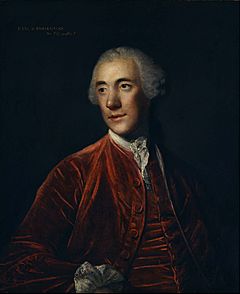Robert Darcy, 4th Earl of Holderness facts for kids
Quick facts for kids
The Earl of Holderness
|
|
|---|---|
 |
|
| Secretary of State for the Southern Department | |
| In office 6 April 1757 – 27 June 1757 |
|
| Monarch | George II |
| Preceded by | William Pitt |
| Succeeded by | William Pitt |
| In office 18 June 1751 – 23 March 1754 |
|
| Monarch | George II |
| Preceded by | The Duke of Bedford |
| Succeeded by | Thomas Robinson |
| Secretary of State for the Northern Department | |
| In office 23 March 1754 – 25 March 1761 |
|
| Monarch | George II George III |
| Preceded by | The Duke of Newcastle |
| Succeeded by | The Earl of Bute |
| Personal details | |
| Born | 17 May 1718 |
| Died | 16 May 1778 (aged 59) Syon Hill, London, England |
| Nationality | Great Britain |
| Spouse | Mary Doublet |
| Children | Amelia Osborne, Marchioness of Carmarthen |
| Parents | Robert Darcy, 3rd Earl of Holderness Lady Frederica Schomberg |
| Occupation | Diplomat, politician |
Robert Darcy, 4th Earl of Holderness (born May 17, 1718 – died May 16, 1778) was an important British diplomat and politician. Before 1721, he was known as Lord Darcy and Conyers. He held several high-ranking positions in the British government.
Contents
Robert Darcy's Career and Roles
Robert Darcy had a busy career serving his country. He worked as a diplomat and a politician.
Early Career and Diplomacy
In 1741, Robert Darcy worked with the famous composer G.F. Handel. They helped produce an opera called Deidamia.
Later, he became an ambassador. An ambassador is a country's official representative in another country.
- From 1744 to 1746, he was the ambassador in Venice, Italy.
- From 1749 to 1751, he represented Britain in The Hague, Netherlands.
Becoming a Secretary of State
In 1751, Robert Darcy became the Secretary of State for the Southern Department. This was a very important job, like being a top government minister. This role mainly dealt with relations with countries in southern Europe.
In 1754, he moved to the Northern Department. This role focused on relations with countries in northern Europe. He stayed in this position until March 1761.
He was removed from this job by King George III. Even though he held a high position, he often followed the lead of other powerful politicians. These included the Duke of Newcastle and William Pitt the Elder.
Later Life and Royal Service
From 1771 to 1776, Robert Darcy served as a governor. He helped educate two of the King's sons. This was a respected role, showing the King trusted him.
Robert Darcy did not have any sons who lived past childhood. Because of this, most of his noble titles ended when he died. However, some titles, like the Baronies of Darcy de Knayth and Conyers, were inherited by his daughter. His daughter, Amelia Osborne, Marchioness of Carmarthen, also inherited a Portuguese title, the Countship of Mértola.
Robert Darcy's Family Life
Robert Darcy was the only son of Robert Darcy, 3rd Earl of Holderness. His mother was Lady Frederica Schomberg.
On October 29, 1743, Robert Darcy married Mary Doublet. She was the daughter of Francis Doublet. Robert and Mary had three children together. Sadly, only one of them lived to be an adult.
Children of Robert Darcy
- George Darcy, Lord Darcy and Conyers (born September 1745 – died September 27, 1747). He passed away when he was very young.
- Thomas Darcy, Lord Darcy and Conyers (born and died 1750). He was buried in The Hague, Netherlands.
- Lady Amelia Darcy (born October 12, 1754 – died January 27, 1784). She was their only child who survived childhood.
- Lady Amelia first married Francis Osborne, Marquess of Carmarthen. They had children together. They later divorced in 1779.
- She then married John "Mad Jack" Byron. He was the father of the famous poet Lord Byron. Lady Amelia and John Byron had one daughter named Augusta Leigh.
See also
 | Emma Amos |
 | Edward Mitchell Bannister |
 | Larry D. Alexander |
 | Ernie Barnes |

